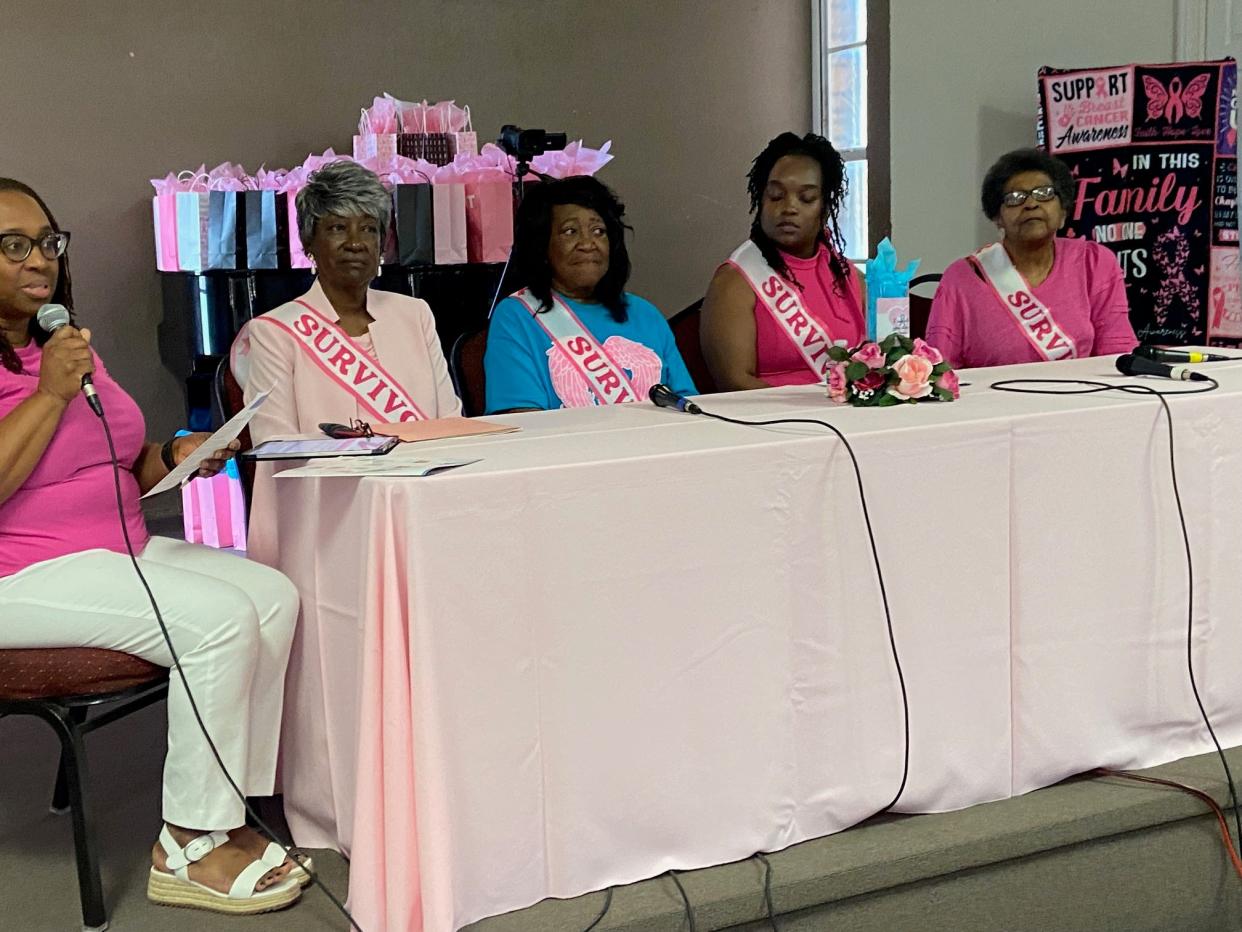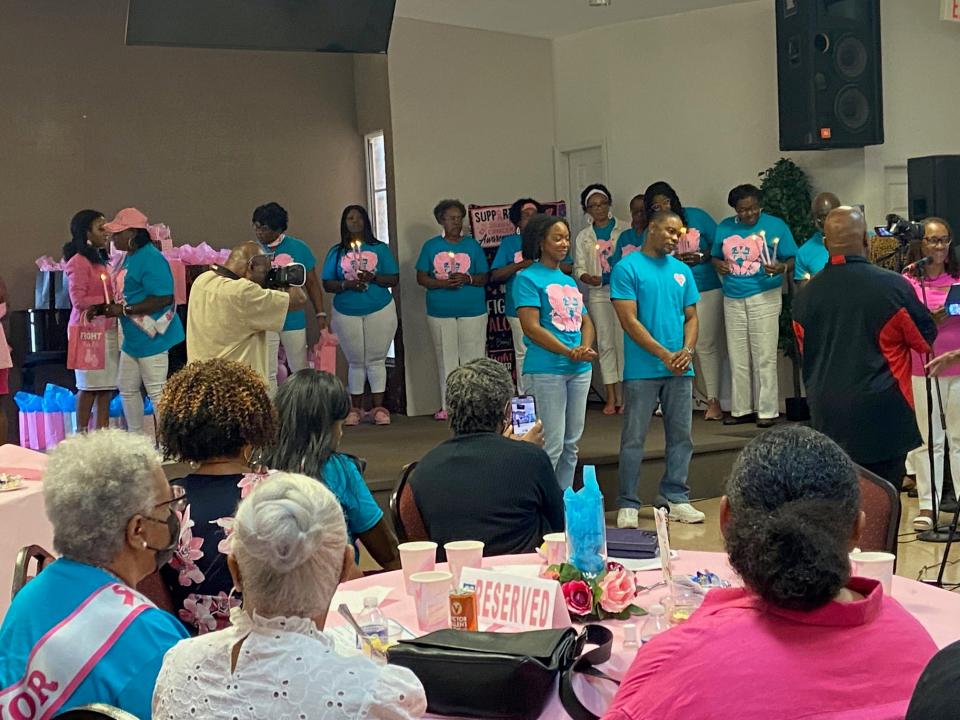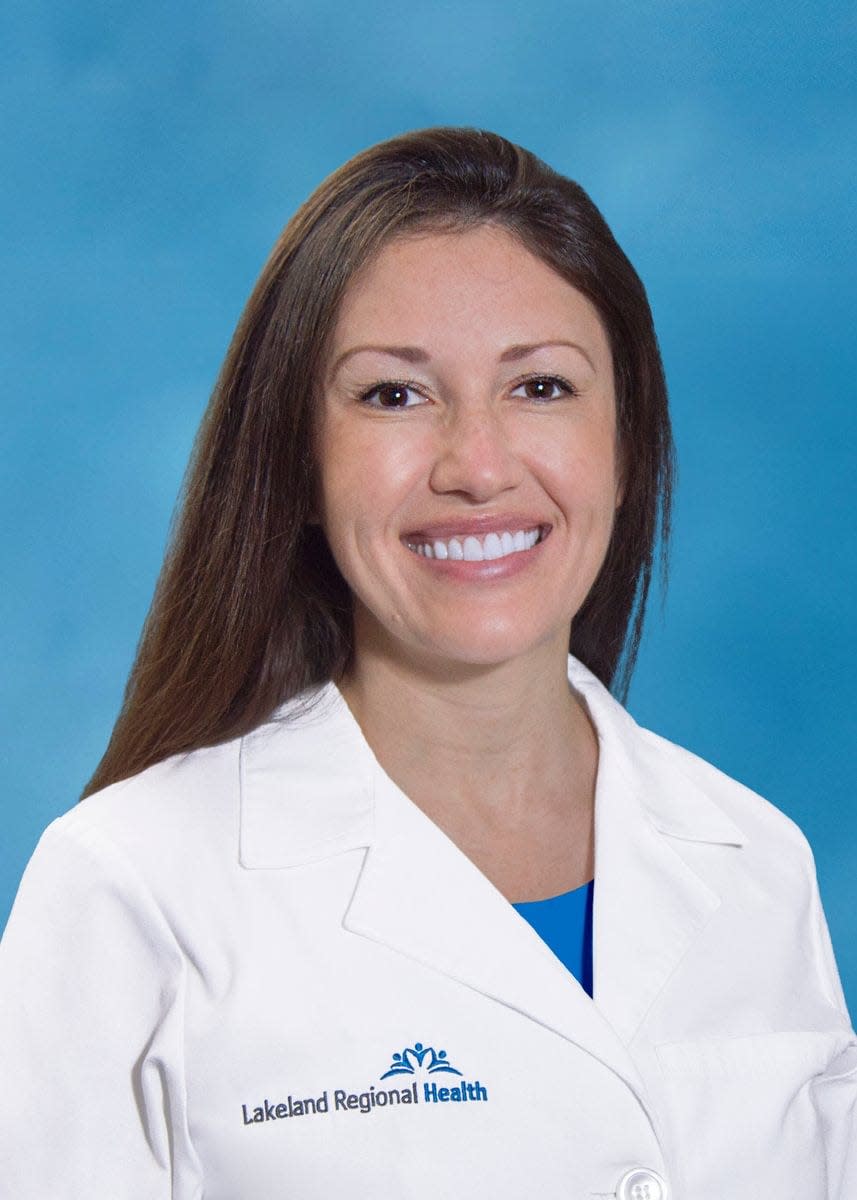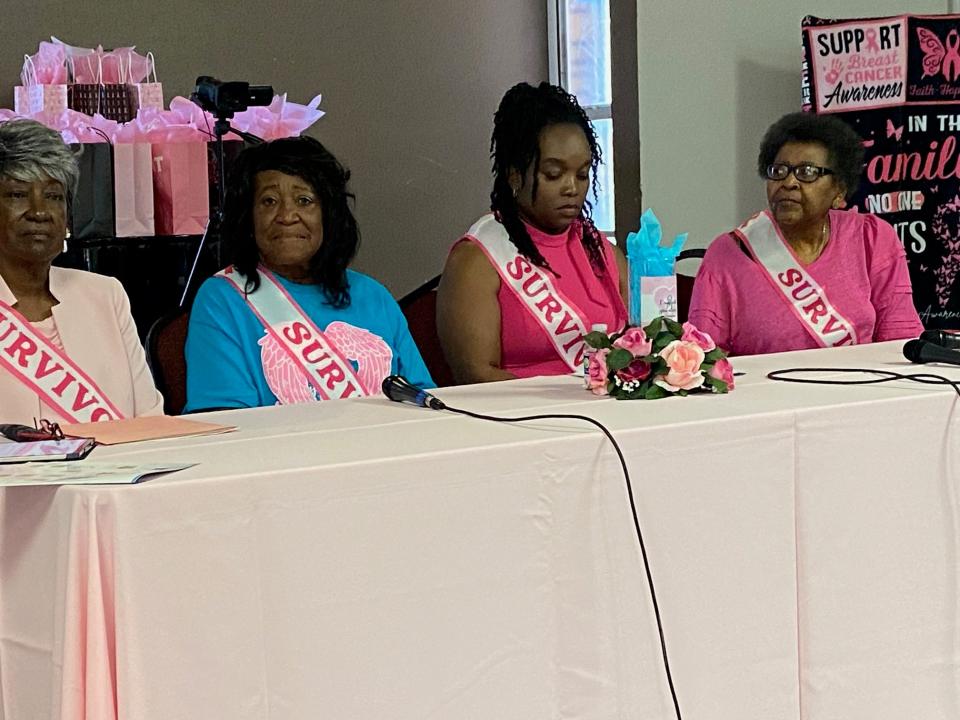'Know your body': Black women speak out about their breast cancer survival

Fewer than 30 people came 10 years ago when New Mt. Zion Missionary Baptist Church held its first breast health awareness seminar.
Organizer Barbara Harrison began pleading, mostly unsuccessfully at first, for Black breast-cancer survivors to tell their stories.
What a difference the past decade made.
Four Black women, with survival times ranging from 37 years to two years, were featured panelists October 14 at the seminar’s 10th annual seminar.
They preached strength and resilience; the importance of family, friends and faith in survival; and the value of being informed through education, awareness, breast self-examination and mammograms.
Twenty-seven breast-cancer survivors were honored before an audience of 230 in the Lakeland church’s packed fellowship hall.
“It is so important to know your body,” said Cynthia Ross Waring, one of the panelists, who sought treatment after she felt a breast lump.
When told the cancer had spread into her lymph nodes, she didn’t lose courage.
“I said, ‘I want aggressive, aggressive, aggressive treatment,’” she said.

That was 30 years ago.
Panelist Helen Figgs, diagnosed at 34, had surgery to remove the tumor, followed by radiation.
“I did not have a meltdown until treatment ended and it took them two months to convince me I wasn’t going to die,” Figgs told the mostly female audience.
She’s been alive for 37 years since then.
“Most cancer survivors during the early years were secretive and did not want to share their stories,” Harrison said. “Today they are more willing to help others by sharing details of their journey, including how they were diagnosed (and) treated.”
Got lower back pain? The treatment options are almost as varied as the causes
She and Stephanie McLean of the American Cancer Society call the change a highly encouraging sign of Black women becoming increasingly empowered to fight the disease that disproportionately impacts them.
“Grassroots stories like this really do help,” said Harrison, former vice president of Lakeland Regional Health’s Hollis Cancer Center and creator of Mt. Zion’s Health and Wellness Ministry.
Resistance and delay
Survivor successes offset the statistics on disparity:
Black women’s incidence of breast cancer is lower, but their death rate is higher.
Five-year survival for breast cancers overall (all stages combined) was 83% for Black women, 92% for white women and 88% for Hispanic women in 2012-2018.
Breast cancer is the leading cause of cancer death in Black and Hispanic women in the United States. It’s the second leading cause of cancer death in U.S. women overall with lung cancer first.
Reasons include later diagnosis and more likelihood of an elusive but aggressive type of cancer called triple negative breast cancer, with which Black women have 2.3 times higher odds of being diagnosed than white women do.
Five-year overall survival rate for that cancer is 77%, compared with 93% five-year survival for all other types of breast cancers.
“They are very aggressive, and they are hard to detect,” Dr. Vanessa Prowler said of triple-negative breast cancer cells. “They often look like cysts.”

Prowler, fellowship-trained breast cancer surgeon at LRH’s Hollis Cancer Center, spoke at the seminar.
Studies also indicate Black women may have more delay in getting follow up treatment after a mammogram and a higher rate of not accepting chemotherapy.
“Studies have shown that women fear getting sick with chemotherapy so are less likely to go through with it,” Prowler said.
Resistance and delay are something survivors who spoke hope to change by sharing their survival stories.
Finding breast cancer while it’s still localized in the breast makes a significant difference in survival statistics.
Ninety six percent of Black women whose cancer was caught while localized were alive after five years. Survival was 97% for Hispanic women and greater than 99% for white women.
Improvements in treatment and growing awareness play a role in that.
'Sharing ... can keep you sane'
Treatments and diagnosis had improved significantly when Arielle Milligan, a seven-year survivor, was found to have breast cancer at age 36. It was stage zero, a cancer of the milk ducts, but elusive with a strong potential to spread.
Although she had been sporadic about doing breast self exam at such a young age, an internal voice she attributes to God led her to do one in April 2016. She felt something in one breast and got a mammogram.
It found two areas of cancer in the other breast. The pathology report after her surgery found a total of five.
She urges other survivors to talk to friends or family as they go through treatment and continue as survivors.
“Sharing your health experiences and challenges can keep you sane,” she said.
Sharing can mean discussing both the positive and negative aspects of how you feel during treatment and after.
The worst part, Waring said, was when her hair fell out after the first chemotherapy treatment. Her husband, Timothy, who had an Afro then, promptly said he would shave it off “so we’d be bald together.”
A safe place: Memory Cafe offers activities for people with dementia and their families
Albertha Whittley-Tabron, diagnosed and treated two years ago, shared mantras that kept her strong through chemotherapy, surgery and radiation for a “very aggressive” type of the cancer:
“In God, I move and breathe and have my being,” she said. “I am healed. I am whole and I am healthy.”
Being diagnosed at age 78 makes Tabron both a role model and a cautionary tale for older women who may be tempted to opt out of mammograms.
“Some guidelines say stop mammograms at 75 but not in my world,” Prowler said.
“That’s when they found my breast cancer, after I was 75,” exclaimed Joyce Stephens, one of survivors not on the panel.

“We see that every day,” Prowler said.
The survivors urged women to check their own breasts regularly and be familiar with how their breasts normally feel. Some use the word breast self exam.
“I recommend that women know their bodies/know what is normal for them so they can get help if something feels different,” Prowler said.
“A self breast exam generally only picks up larger cancers, whereas mammograms can pick up cancers one to three years earlier,” she said in a follow-up email.
However, many women, including some of the survivors, consider self breast exams important in addition to mammograms.
Women should get clinical breast exams as part of their routine visits with their gynecologist or obstetrician gynecologist, Prowler added.
Voices of Black Women
Making Black women aware of their greater risk of triple negative breast cancer can cause fear because it has fewer treatment options than other invasive breast cancers. That cancer doesn’t have estrogen or progesterone receptors or enough HER2 protein to make hormone therapy or targeted HER2 drugs work.
Treatments do exist for it, such as chemotherapy, surgery and radiation.
“Our best tool against breast cancer is early detection, whether that be by self breast exams if you are not old enough to get mammograms, or by mammograms annually if you are at or over 40 years of age,” Prowler said.
Another way for Black women in Polk County to become empowered will be available next spring, when the American Cancer Society expands its pilot Voices of Black Women project to Florida, 17 other states and the District of Columbia.
It’s already enrolling in Georgia and Virginia.
Black women between the ages of 25 and 55 can enroll, McLean said, if they haven’t had cancer (other than basal or squamous cell skin cancer.)
It involves completing a health and life history survey through a secure portal and updating their health information twice a year for at least 30 years.
The project’s purpose is to gain a better understanding of factors affecting Black women’s health, then using that knowledge in developing plans to improve it.
Questions about Voices of Black Women? Call 800-494-4113 or email thevoices@cancer.org .
Robin Williams Adams can be reached at robinwadams99@yahoo.com.
This article originally appeared on The Ledger: Black women speak about surviving breast cancer with lower odds

